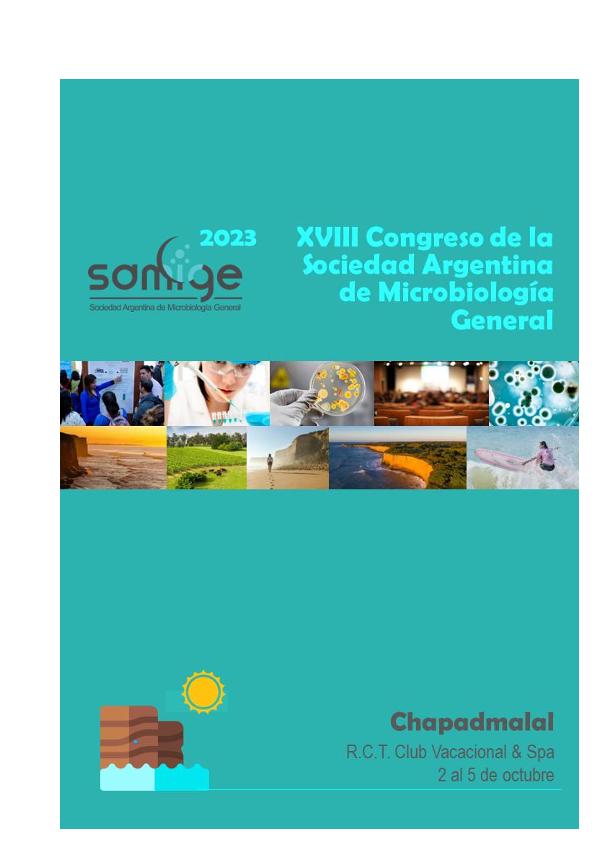Mostrar el registro sencillo del ítem
dc.contributor.author
Diaz, Mariana Andrea

dc.contributor.author
Pereyra, Martina María

dc.contributor.author
Rasuk, Maria Cecilia

dc.contributor.author
Dib, Julian Rafael

dc.date.available
2023-11-06T18:28:33Z
dc.date.issued
2023
dc.identifier.citation
Towards the sustainable production of lemons: native yeasts as biological control agents; XVIII Congreso de la Sociedad Argentina de Microbiología General; Chapadmalal; Argentina; 2023; 30-30
dc.identifier.isbn
978-631-90156-1-4
dc.identifier.uri
http://hdl.handle.net/11336/217236
dc.description.abstract
The province of Tucumán is positioned as one of the main centers of production and processing of lemons. Among the problems associated with the production of lemons, the economic losses caused by postharvest fungal infections stand out. Chemical fungicides have traditionally been applied as control and preventive measures, but their use entails numerous problems such as environmental contamination, toxicity in humans and restrictions on international markets. However, efficient and sustainable alternatives to the use of such pesticides are not known so far. Thus, the aim of this research was to search for biological control alternatives based on native yeasts, understand the associated mechanisms of action, and formulate a sustainable biocontrol agent. Biocontrol yeasts were isolated from citrus plants and lemon packinghouses. The antagonism of the isolates against Penicillium digitatum in in vitro and in vivo assays as well as the possible mechanisms of action related to biological control were determined. In addition, both liquid and solid formulations were tested. Among the yeast isolates, Clavispora lusitaniae 146stood out as it was able to inhibit P. digitatum in vitro and also to control green mold onlemons with high efficiency, both in room temperature and cold storage. Yeast 146 was ableto resist stress factors associated with the packaging process and was compatible with carnauba wax. Among the mechanisms of action, the ability to colonize wounds and the competition for space and nutrients were evidenced. C. lusitaniae depicted a broad spectrum of action in controlling green mold on other citrus fruits, such as oranges, mandarins, and grapefruit. C. lusitaniae 146 did not negatively affect the aroma perception of fruits by consumers. Moreover, it was able to remove the mycotoxin patulin from a solution. Different liquid and solid formulations were tested; being the yeast dried by lyophilization in combination with sucrose and skimmed milk the most promising. The native yeast C. lusitaniae 146 is a promising biological control agent for the control of P. digitatum in lemons and other varieties of citrus fruits. A yeast-based formulation would replace the use of chemical fungicides and promote the organic production of lemons.
dc.format
application/pdf
dc.language.iso
eng
dc.publisher
Sociedad Argentina de Microbiología General
dc.rights
info:eu-repo/semantics/openAccess
dc.rights.uri
https://creativecommons.org/licenses/by-nc-sa/2.5/ar/
dc.subject
LEMON
dc.subject
YEAST
dc.subject
BIOCONTROL
dc.subject.classification
Bioproductos, Biomateriales, Bioplásticos, Biocombustibles, Bioderivados, etc.

dc.subject.classification
Biotecnología Industrial

dc.subject.classification
INGENIERÍAS Y TECNOLOGÍAS

dc.title
Towards the sustainable production of lemons: native yeasts as biological control agents
dc.type
info:eu-repo/semantics/publishedVersion
dc.type
info:eu-repo/semantics/conferenceObject
dc.type
info:ar-repo/semantics/documento de conferencia
dc.date.updated
2023-11-01T15:30:24Z
dc.journal.pagination
30-30
dc.journal.pais
Argentina

dc.journal.ciudad
Cordoba
dc.description.fil
Fil: Diaz, Mariana Andrea. Consejo Nacional de Investigaciones Científicas y Técnicas. Centro Científico Tecnológico Conicet - Tucumán. Planta Piloto de Procesos Industriales Microbiológicos; Argentina
dc.description.fil
Fil: Pereyra, Martina María. Consejo Nacional de Investigaciones Científicas y Técnicas. Centro Científico Tecnológico Conicet - Tucumán. Planta Piloto de Procesos Industriales Microbiológicos; Argentina
dc.description.fil
Fil: Rasuk, Maria Cecilia. Consejo Nacional de Investigaciones Científicas y Técnicas. Centro Científico Tecnológico Conicet - Tucumán. Planta Piloto de Procesos Industriales Microbiológicos; Argentina
dc.description.fil
Fil: Dib, Julian Rafael. Consejo Nacional de Investigaciones Científicas y Técnicas. Centro Científico Tecnológico Conicet - Tucumán. Planta Piloto de Procesos Industriales Microbiológicos; Argentina. Universidad Nacional de Tucumán. Facultad de Bioquímica, Química y Farmacia. Instituto de Microbiología; Argentina
dc.relation.alternativeid
info:eu-repo/semantics/altIdentifier/url/https://samige.org.ar/wp-content/uploads/2023/09/Libro-de-Resumenes-Final.pdf
dc.conicet.rol
Autor

dc.conicet.rol
Autor

dc.conicet.rol
Autor

dc.conicet.rol
Autor

dc.coverage
Internacional
dc.type.subtype
Congreso
dc.description.nombreEvento
XVIII Congreso de la Sociedad Argentina de Microbiología General
dc.date.evento
2023-10-02
dc.description.ciudadEvento
Chapadmalal
dc.description.paisEvento
Argentina

dc.type.publicacion
Book
dc.description.institucionOrganizadora
Sociedad Argentina de Microbiología General
dc.source.libro
Libro de resumenes del XVIII Congreso de la Sociedad Argentina de Microbiología General
dc.date.eventoHasta
2023-10-05
dc.type
Congreso
Archivos asociados
